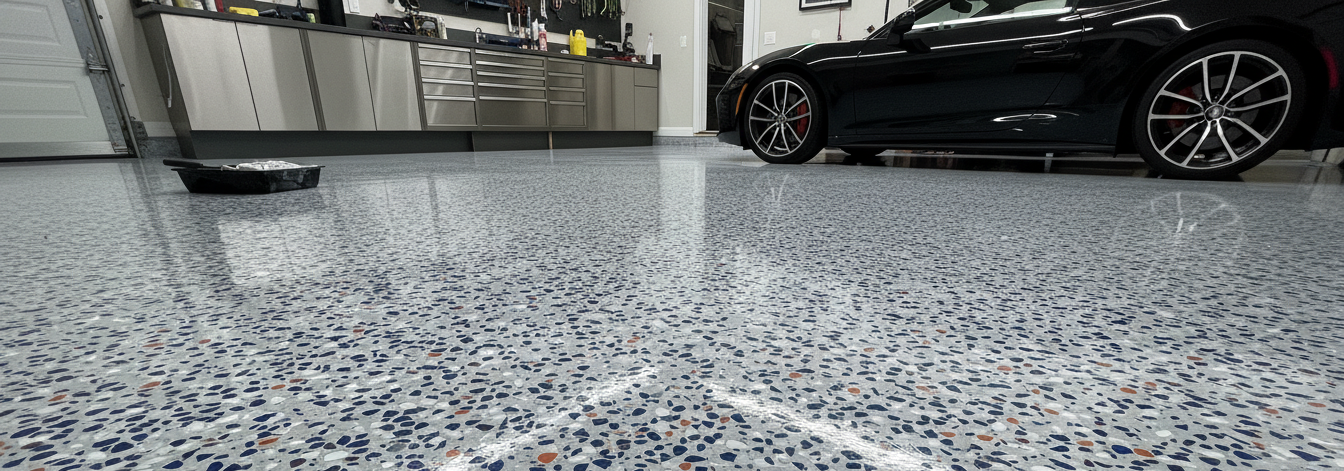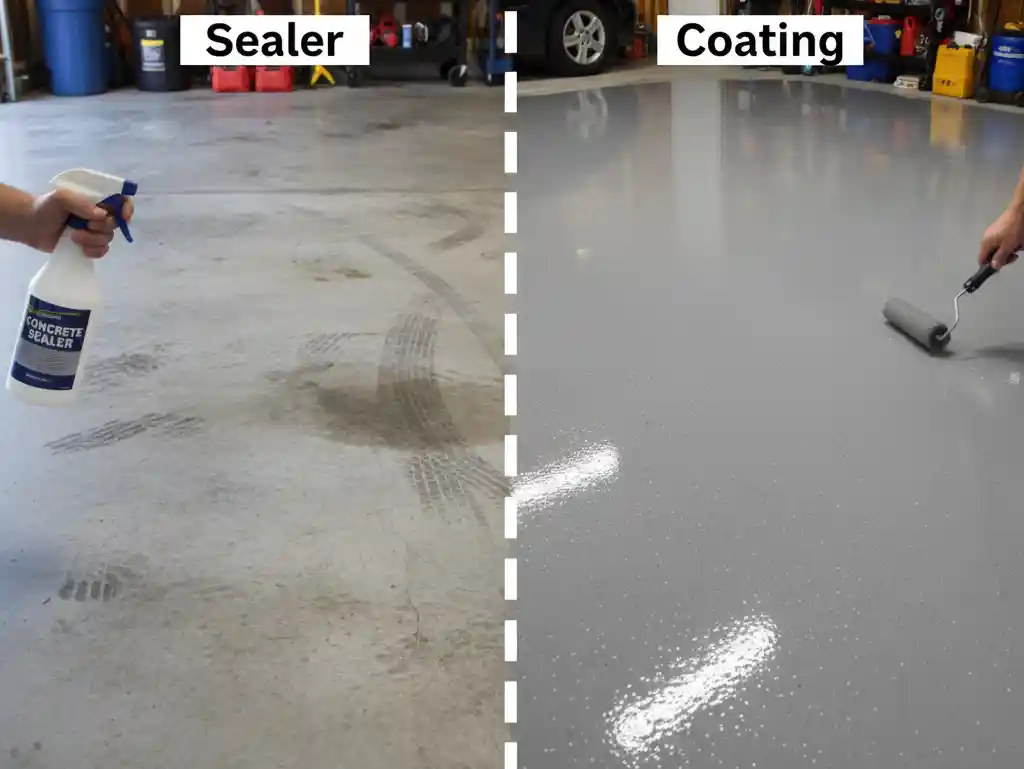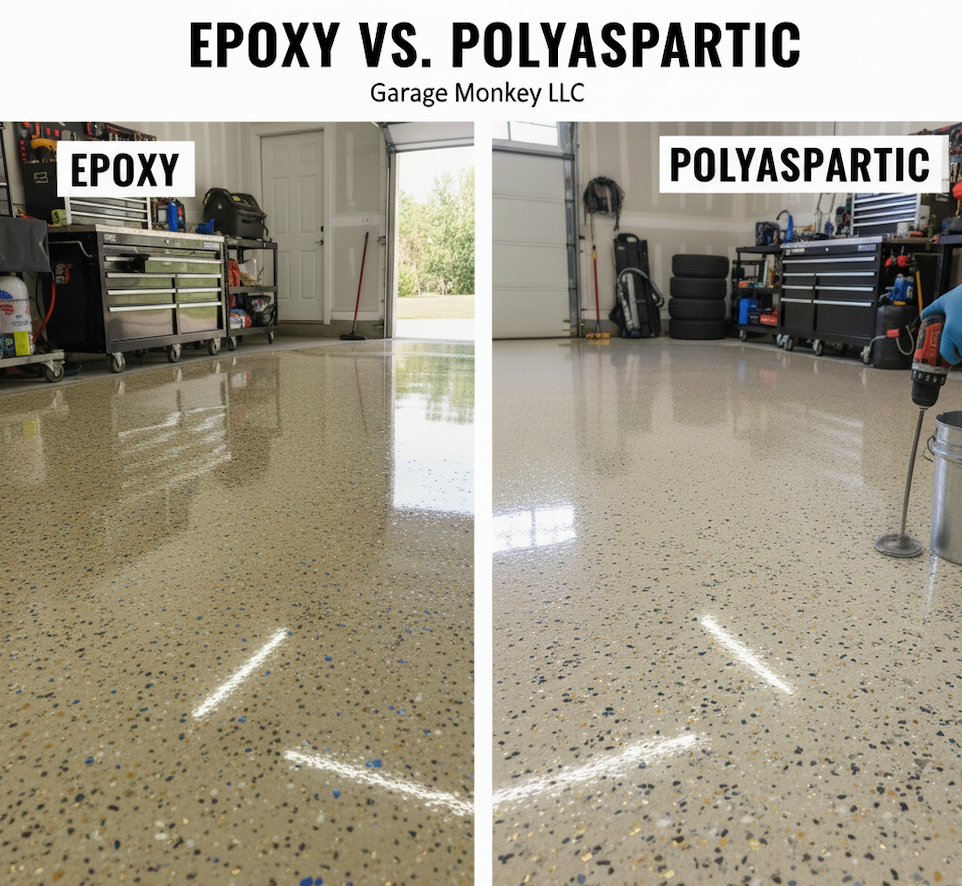Garage Floor Sealer vs. Coating: The Critical Choice Most Homeowners Get Wrong
Use our quick contact form to talk to our team about upgrading your garage.

When planning a garage upgrade, most homeowners obsess over brands, colors, and flake options. They spend hours comparing epoxy kits and reading reviews, believing the key to a perfect garage floor lies in picking the "best" product off the shelf. This is the single most critical mistake you can make. The real, foundational decision—the one that dictates long-term durability, aesthetics, cost, and whether your project is a DIY success or a peeling nightmare—has nothing to do with a brand name. It's about understanding the fundamental difference between a penetrating sealer and a topical coating.
Choosing the wrong category for your needs is like trying to use a raincoat to insulate your home in winter. Both offer protection, but they are engineered for entirely different purposes. This guide will demystify these two core product families, helping you make the one decision that truly matters. We will explore when to simply protect your existing concrete versus when you need to build a new high-performance surface on top of it, reveal the non-negotiable "DIY Litmus Test" that predicts project success, and decode the chemistry behind pro-grade options so you can choose with confidence.
The Fundamental Divide: Sealer vs. Coating Explained
Before you can select the right product, you must grasp how these two categories work. They interact with your concrete garage floor in fundamentally different ways, defining their performance, appearance, and application process.
What is a Garage Floor Sealer? The Guardian Within
A penetrating sealer is designed to soak into the top layer of your concrete, occupying the microscopic pores within the slab itself. Think of it like a moisturizer for your skin—it absorbs in rather than sitting on the surface. Its primary job is to protect the concrete from the inside out by densifying it or by creating a hydrophobic (water-repelling) barrier. This approach offers nearly invisible protection while preserving the natural look and texture of the concrete. Because they don't form a film on the surface, they cannot peel, flake, or delaminate.
- Primary Function: Sub-surface protection against moisture, salt, oil stains, and concrete dust.
- Appearance: Typically a natural, matte, or low-sheen finish that doesn't significantly alter the concrete's appearance. A penetrating concrete sealer offers nearly invisible protection, while a film-forming concrete sealer provides a smooth, durable finish.
- Key Types: Concrete densifiers, silane/siloxane sealers, and some water-based acrylics.
- Durability: Excellent longevity (5-10+ years) as they become part of the concrete itself and don't wear away from surface traffic.
What is a Garage Floor Coating? The Armor on Top
A topical coating, as the name implies, is a product that forms a thick, durable film on top of the concrete surface. It doesn't penetrate deeply; instead, it bonds to the prepared concrete to create a brand-new, non-porous surface. This is the option you choose when you want to transform your garage floor's appearance, hide imperfections, and create a seamless, high-performance layer that offers the highest level of protection.
- Primary Function: To create a new, high-build, seamless surface offering superior abrasion resistance, chemical protection, and aesthetic enhancement.
- Appearance: Can range from a solid color to a decorative flake or metallic system. Finishes include high gloss, satin, and matte.
- Key Types: Epoxy, polyaspartic, polyurea, and urethane systems.
- Durability: Varies by chemistry and thickness, but a professionally installed system is the longest lasting garage floor coating, engineered for heavy-duty use. It creates an exceptional barrier against almost everything.
Mapping Your Use-Case: Which Path Should You Take?
Now that you understand the difference, you can diagnose your own needs. Your garage's condition, your primary activities, and your aesthetic goals will point you clearly toward either a sealer or a coating.

When to Choose a Sealer: Protecting and Preserving
A garage floor sealer is the ideal choice when your concrete is in good condition and your goal is primarily functional protection rather than a dramatic aesthetic overhaul. Consider a sealer if:
- You Have New Concrete: Sealing a new slab is crucial. The best concrete sealer for new garage floor slabs is a penetrating type, which helps the concrete cure properly and protects it from stains and moisture from day one.
- You Want to Stop Concrete Dusting: If you're tired of a fine powder being tracked into your home, a garage floor dust proofing sealer, particularly a concrete densifier, will solve the problem by hardening the surface.
- You Live in a Wet or Snowy Climate: For protection against de-icing salts and water intrusion, the best garage floor sealer for wet climates is a silane siloxane penetrating sealer. This creates a powerful moisture barrier deep within the concrete.
- You Prefer a Natural Look: If you appreciate the industrial aesthetic of bare concrete but want to prevent oil stains, a clear penetrating sealer is the perfect solution. A matte finish concrete sealer for garage floors offers protection without shine.
- Budget is a Primary Concern: Sealers are generally more affordable than multi-layer coating systems, making them the best budget garage floor sealer option for effective protection.
Ultimately, the answer to "is it worth sealing a concrete garage floor?" is a resounding yes. The small investment prevents far more expensive problems down the road.
When to Choose a Coating: Transforming and Fortifying
A garage floor coating is a significant upgrade that creates a new, functional surface. It's the right path when your needs go beyond simple protection. Opt for a coating if:
- Your Concrete is Old or Damaged: If your floor has cracks, spalling, or extensive staining, a thick coating system is the best option for garage floor concrete restoration and sealing. It can hide a multitude of flaws and create a brand-new surface.
- You Need Maximum Durability and Chemical Resistance: For workshops, auto enthusiasts, or high-traffic areas, a heavy duty garage floor coating like epoxy or polyurea offers unparalleled protection against dropped tools, jacks, chemicals, and oil.
- You Want a "Showroom" Finish: Coatings offer endless aesthetic possibilities. From a solid color high gloss garage floor protection system to intricate epoxy flake floor coating kits, you can create a custom look that enhances your home's value.
- Cleanliness is a Top Priority: The seamless, non-porous surface of a coating is incredibly easy to clean. Spills wipe right up, making it ideal for a multi-purpose space like a home gym or play area.
The DIY Litmus Test: Why Surface Prep is the Point of No Return
The biggest divide between sealers and coatings isn't just their chemistry—it's the required level of preparation. This is where most DIY projects fail, and understanding the difference is your litmus test for whether you should tackle the job yourself.
The Forgiving Nature of Sealers
Applying a penetrating sealer is a far more forgiving process for a beginner. Because the product works by soaking in, the primary goal of preparation is to ensure the concrete is clean and porous.
How to prepare a garage floor for sealing:
- Thorough Cleaning: The surface must be completely free of dirt, oil, grease, and any previous coatings or paints. A degreaser and a pressure washer are your best friends here.
- Ensure Porosity: Sprinkle some water on the concrete. If it soaks in quickly, you're ready to seal. If it beads up, you may have a pre-existing sealer that needs to be removed.
This straightforward process is why many homeowners find that the which garage floor sealer is easiest to apply is almost always a penetrating type.
The Unforgiving Demands of Coatings
A coating does not penetrate; it forms a mechanical bond with the top layer of the concrete. If that top layer is not perfectly clean and profiled, the coating will fail. This is the primary cause of "hot tire pickup," where the heat and pressure from your vehicle's tires lift the coating right off the floor.
Garage floor surface preparation for coatings is non-negotiable:
- Deep Cleaning and Degreasing: This is more intense than for sealing. Every last trace of oil, silicone, and other contaminants must be removed, as they will act as a bond-breaker.
- Moisture Testing: Before applying a non-breathable coating like epoxy, you must learn how to test concrete for moisture before sealing. Taping a plastic square to the floor for 24 hours is a simple method; if condensation forms, you have a moisture issue that must be addressed.
- Creating a Surface Profile: The concrete must be mechanically abraded to create a texture similar to 80-grit sandpaper. This "profile" gives the coating something to physically grip. This is achieved through diamond grinding or concrete etching before sealing with an acid solution. This is the most critical step and the one most often done incorrectly in DIY kits. As experts at This Old House note, when preparing a floor, if water beads up, there may be a sealer present that needs to be removed before applying an epoxy coating. This underscores the importance of a properly prepared, porous surface.
Decoding the Options: A Glossary of Garage Floor Chemistry
With a clear understanding of the two main families, let's break down the specific types of products you'll encounter.
The Sealer Family: Penetrating Protectors
- Concrete Densifiers: These are lithium, sodium, or potassium silicate-based products that penetrate the concrete and trigger a chemical reaction. This reaction forms crystalline structures within the concrete's pores, making it harder and denser from the inside out. They are excellent for reducing dust and increasing surface abrasion resistance. Many wonder what is the difference between a concrete densifier and a sealer; a densifier is a type of sealer that works by hardening rather than just repelling liquids.
- Silane/Siloxane Sealers: These are the workhorses of water and salt repellency. They are penetrating, breathable sealers that don't change the concrete's appearance but provide excellent protection against moisture intrusion, freeze-thaw damage, and de-icing salts. This makes them a top choice for a garage floor waterproofing sealer.
- Acrylic Concrete Sealer for Garage: Acrylics can be tricky as they come in both water-based and solvent-based formulas and can be either penetrating or film-forming. As a sealer, a water-based acrylic offers mild protection and a slight sheen but has lower durability than other options.
The Coating Family: High-Performance Surfaces
- Epoxy: The most well-known garage floor coating. True epoxy is a two-part system. As The Spruce explains, true epoxy coatings harden using a chemical reaction between a resin and a hardener (catalyst), unlike paint which hardens through evaporation. They create a thick, hard, and durable surface that offers excellent adhesion and chemical resistance. It's crucial not to confuse this with "epoxy paint." Genuine floor epoxy should not be confused with 'epoxy paint,' a one-part latex product with a small amount of epoxy added to improve hardness, which is generally not as good in overall performance. While DIY kits are available, the most durable option is 100% solid epoxy is the most durable coating option, but its application is best left to professionals.
- Polyurea & Polyaspartic: These are related chemistries known for their extremely fast cure times and flexibility. They are more UV stable than most epoxies (meaning they won't yellow from sunlight) and remain flexible in colder temperatures. Often, a professional garage floor coating system will use an epoxy base coat for its thickness and bond, topped with a polyaspartic or urethane garage floor topcoat for its superior UV and scratch resistance.
Answering Your Critical Garage Floor Questions
What is the best sealant for a concrete garage floor?
The "best" sealant depends entirely on your goal.
- For invisible protection against water and salt in a cold climate, the best is a high-quality penetrating silane/siloxane sealer.
- For hardening a dusty or soft concrete floor while keeping a natural look, the best is a concrete densifier.
- For the ultimate in durability, chemical resistance, and a transformed look, the best "sealant" is actually a multi-layer epoxy or polyaspartic coating system. Highlighting this distinction, Bob Vila's guide classifies Ghostshield Siloxa-Tek 8500 as a 'Best Penetrating' sealer, while the Rust-Oleum EpoxyShield Kit is a 'Best Epoxy' coating, highlighting the distinct product categories.
What type of garage floor sealer is best?
Again, this loops back to the core thesis. If you mean a true penetrating sealer, a silane/siloxane blend offers the best all-around protection against moisture for a typical residential garage. If you are using "sealer" as a catch-all term, and you need to hide stains and resist heavy wear, then a 100% solids epoxy coating system is the superior choice.
Should you put a sealer on a garage floor?
Absolutely, yes. Unprotected concrete is a porous sponge. What happens if you don't seal your garage floor? It will absorb water, de-icing salts, oil, and other chemicals. This leads to staining, dusting (efflorescence), and spalling—where the surface flakes and pits. A simple sealing is a low-cost, high-value maintenance task that protects your concrete slab, makes it easier to clean, and improves your home's air quality by locking down concrete dust.
Is epoxy or polyaspartic/polyurea better for garage floors?
This is a common question when discussing professional garage floor coating options. It's not a matter of one being universally "better," but rather using them for their strengths.
- Epoxy is favored for base coats because it has a longer working time, allowing for easier application, and it builds a thicker, harder foundation that can fill in minor imperfections.
- Polyaspartic/Polyurea coatings are superior as topcoats. They cure very quickly (sometimes in under an hour), are highly resistant to UV yellowing, offer better scratch resistance, and have more flexibility. Many high-end "one-day" professional systems use a polyaspartic or polyurea base coat and topcoat, but this requires significant skill and specialized equipment to apply correctly.
For most applications, a hybrid system—epoxy base coat and polyaspartic/urethane topcoat—offers the best combination of build, durability, and finish.
The journey to a better garage floor begins not in the paint aisle, but with a clear assessment of your needs. By first deciding whether you need to protect from within (sealer) or build armor on top (coating), you set your project on the path to success. This single decision will guide your budget, your choice of materials, and your approach to surface preparation, ensuring your investment enhances your home and lifestyle for years to come. Contact Garage Monkey for a Free Estimate around the Virginia Beach VA area including Norfolk, Suffolk, Chesapeake and all of Hampton Roads.
Schedule a free consultation to learn more about how Garage Monkey can make your garage the best room in the house.


